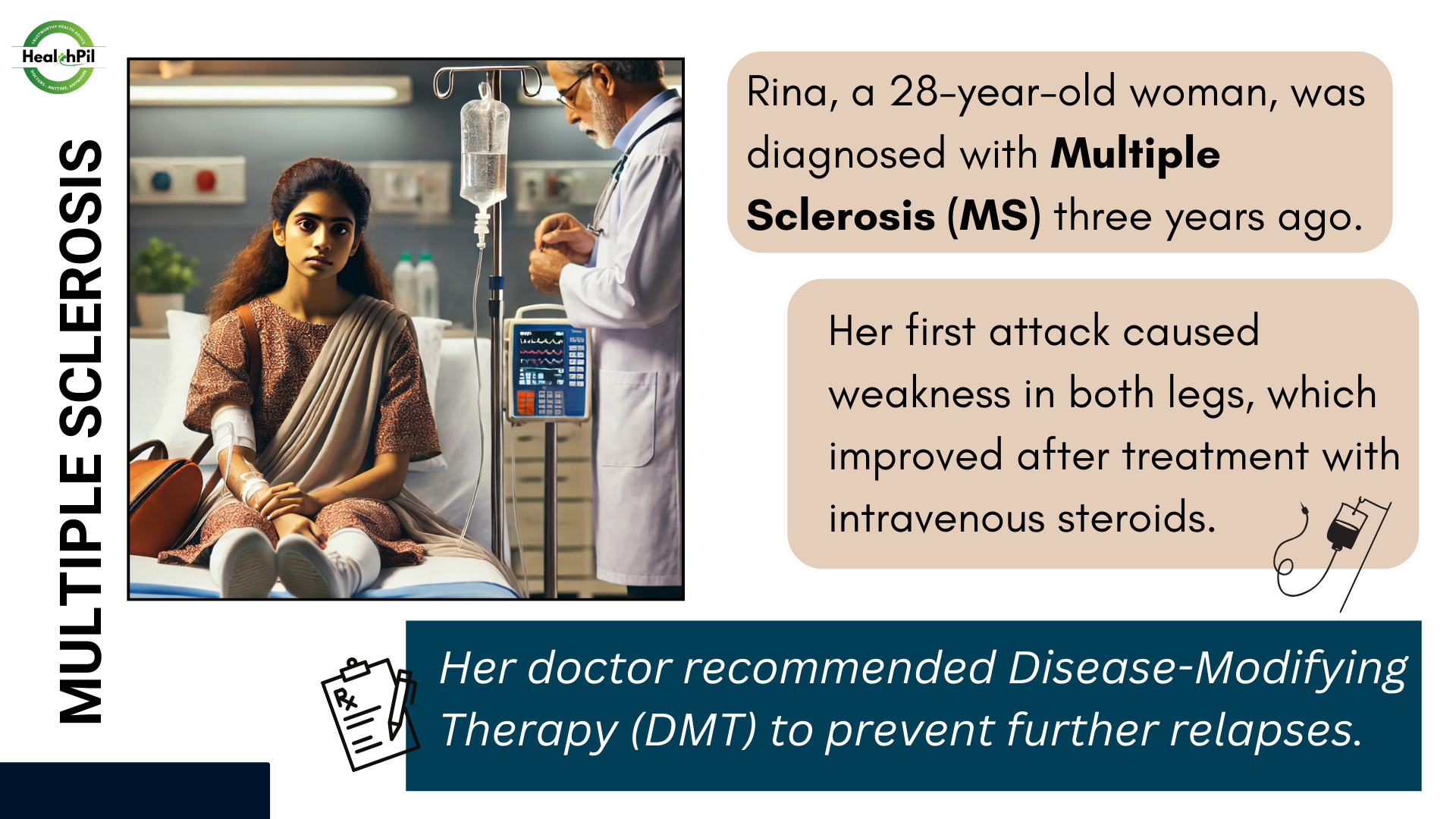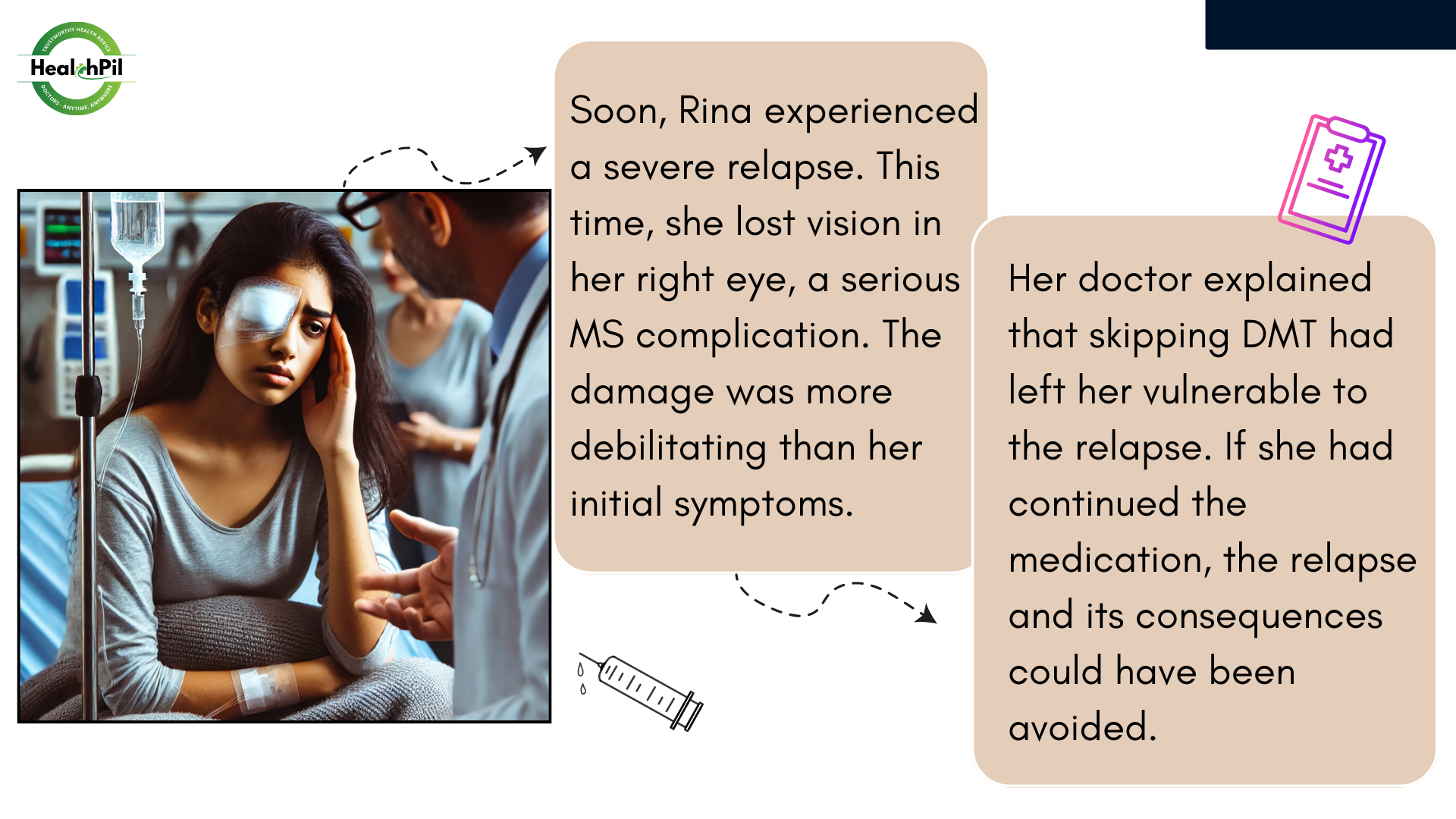





Multiple Sclerosis (MS) is a lifelong condition that affects the central nervous system. To manage the disease and reduce the risk of relapses, patients need to keep continuing their prescribed medication. Skipping or discontinuing prescribed treatments can lead to serious complications, making the condition much harder to control.
Real Life Story: Why Skipping MS Meds Led to a Severe Relapse
28-year-old Rina (name changed) was diagnosed with Multiple Sclerosis (MS) three years ago. Her initial symptoms included weakness in both legs (bilateral lower limb weakness), which improved after treatment with intravenous steroids (IV steroids). After this first attack, her doctor recommended that she should start Disease-Modifying Therapy (DMT) to prevent further relapses and slow the progression of MS.
However, Rina, influenced by social media, decided not to take the DMT medications, thinking she had recovered. For a few months, she remained stable, but she soon experienced another relapse. This time, she lost vision in her right eye (diminution of vision), a serious complication of MS.
Her doctor explained that if she had adhered to the DMT medications, she could have prevented this relapse and its debilitating consequences.
What Is Multiple Sclerosis (MS)?
MS is a disorder where the immune system mistakenly attacks the protective covering (myelin) of nerves in the brain and spinal cord. This damage disrupts neural signals between the brain and peripheral organs and limbs leading to a wide range of symptoms that vary from person to person.
Common MS Symptoms Include:
● Weakness or numbness in the arms or legs
● Balance and coordination problems
● Fatigue
● Blurred or lost vision
● Muscle spasms or tremors
Left untreated, MS symptoms can worsen over time, leading to more significant disability.
Why Stopping MS Medication Is So Dangerous
In Rina’s case, discontinuing her Disease-Modifying Therapy left her vulnerable to more frequent and severe relapses. DMT works by reducing the immune system’s attack on the central nervous system, helping to slow down the disease and prevent further damage.
Once Rina stopped her treatment, her second relapse occurred, and she experienced vision loss in her right eye. MS-related damage like this can become permanent, and with each relapse, the risk of long-term disability increases.
How to Effectively Treat Multiple Sclerosis
● Stick to Your Disease-Modifying Therapy (DMT): DMT is essential management of multiple sclerosis and works by slowing the progression and reducing the frequency of relapses. Strict adherence to DMT is very essential for preventing further neurological damage.
● Use Steroids for Relapses: During an MS relapse, IV steroids can be used to reduce inflammation and help you recover from symptoms. However, steroids aren’t a long-term solution and should not replace the consistent use of DMT.
● Stay in Regular Contact with Your Neurologist: Regular check-ups and MRI scans are key to tracking disease progression and adjusting your treatment. Your neurologist can ensure that your MS is managed properly and make changes to your plan as needed.
● Adopt a Healthy Lifestyle: Eating a balanced diet, staying active, and reducing stress can help you manage MS symptoms, but these should always complement—not replace—medical treatment.
What Happens If You Stop MS Treatment?
● Frequent and Severe Relapses: When MS medication is discontinued, the immune system can attack the nervous system more aggressively. This leads to more relapses, which can cause lasting damage, such as loss of vision or mobility.
● Progressive Neurological Decline: MS can cause irreversible damage to the brain and spinal cord if left untreated. Skipping medication allows the disease to progress faster, leading to significant and often permanent disability.
● Long-Term Disability: Without the right treatment, MS can cause lasting disabilities. Many patients may end up needing mobility aids like canes or wheelchairs. The more relapses that occur, the more difficult it becomes to prevent long-term damage.
HealthPil Can Help You Stay on the Right Path
If you’ve been diagnosed with MS or are worried about symptoms, don’t ignore them. HealthPil offers access to experienced neurologists who can help you get the right treatment plan. You can ask questions for free, get a second opinion, and ensure you’re following the best course of action for your health.
FAQs (Frequently Asked Questions)
What are the early signs of MS?
Common signs include limb weakness, vision problems, fatigue, and issues with balance or coordination.
Can MS be managed with medication?
While there is no cure for MS, it can be managed with Disease-Modifying Therapy (DMT) and steroids during relapses to control symptoms and slow disease progression.
What happens if I stop my MS medications?
Stopping medications increases the risk of relapses and can lead to permanent damage, including vision loss, mobility problems, and other neurological issues.
Can MS lead to permanent disability?
Yes, if not properly treated, MS can cause lasting damage to the nervous system, leading to permanent disability.
Disclaimer:
This article is intended for informational purposes only and should not be considered medical advice. If you have been diagnosed with MS or are experiencing symptoms, please seek guidance from a healthcare professional.

